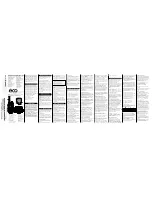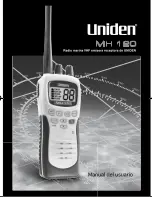
Receiver
The output of the post-RF amplifier filter which is connected to the passive double balanced mixer
consists of T301, T302 and CR306. Matching of the filter to the mixer is provided by C381. After
mixing with the first LO signal from the voltage controlled oscillator (VCO) using low side injection, the
RF signal is down-converted to the 45.1 MHz IF signal.
The IF signal coming out of the mixer is transfered to the crystal filter (FL301) through a resistor pad
and a diplexer (C322 and L310). Matching to the input of the crystal filter is provided by C324 and
L311. The crystal filter provides the necessary selectivity and intermodulation protection.
5.2
Receiver Back-End
(Refer to
UHF Band 2 Receiver Back End Schematic Diagram
The output of crystal filter FL301 is matched to the input of IF amplifier transistor Q302 by
components R352 and C325. Voltage supply to the IF amplifier is taken from the receive 5 volts (R5).
The IF amplifer provides a gain of about 7dB. The amplified IF signal is then coupled into U301(pin 3)
via C330, C338 and L330 which provides the matching for the IF amplifier and U301.
The IF signal applied to pin 3 of U301 is amplified, down-converted, filtered, and demodulated, to
produce the recovered audio at pin 27 of U301. This IF IC is electronically programmable, and the
amount of filtering (which is dependent on the radio channel spacing) is controlled by the
microprocessor. Additional filtering, once externally provided by the conventional ceramic filters, is
replaced by internal filters in the IF module (U301).
The IF IC uses a type of direct conversion process, whereby the externally generated second LO
frequency is divided by two in U301 so that it is very close to the first IF frequency. The IF IC (U301)
synthesizes the second LO and phase-locks the VCO to track the first IF frequency. The second LO
is designed to oscillate at twice the first IF frequency because of the divide-by-two function in the IF
IC.
In the absence of an IF signal, the VCO will “search” for a frequency, or its frequency will vary close to
twice the IF frequency. When an IF signal is received, the VCO will lock onto the IF signal. The
second LO/VCO is a Colpitts oscillator built around transistor Q320. The VCO has a varactor diode,
CR310, to adjust the VCO frequency. The control signal for the varactor is derived from a loop filter
consisting of C362, C363, C364, R320 and R321.
The IF IC (U301) also performs several other functions. It provides a received signal-strength
indicator (RSSI) and a squelch output. The RSSI is a dc voltage monitored by the microprocessor,
and used as a peak indicator during the bench tuning of the receiver front-end varactor filter. The
RSSI voltage is also used to control the automatic gain control (AGC) circuit at the front-end.
The demodulated signal on pin 27 of U301 is also used for squelch control. The signal is routed to
U404 (ASFIC) where squelch signal shaping and detection takes place. The demodulated audio
signal is also routed to U404 for processing before going to the audio amplifier for amplification.
Summary of Contents for GP328 Plus
Page 4: ......
Page 6: ...ii THIS PAGE INTENTIONALLY LEFT BLANK ...
Page 22: ...2 2 Recommended Test Tools THIS PAGE INTENTIONALLY LEFT BLANK ...
Page 24: ...3 2 Error Codes THIS PAGE INTENTIONALLY LEFT BLANK ...
Page 70: ...5A 14 Notes For All Schematics and Circuit Boards THIS PAGE INTENTIONALLY LEFT BLANK ...
Page 86: ...5A 30 Circuit Board Schematic Diagrams and Parts List THIS PAGE INTENTIONALLY LEFT BLANK ...
Page 106: ...5C 14 Notes For All Schematics and Circuit Boards THIS PAGE INTENTIONALLY LEFT BLANK ...
Page 140: ...5C 14 Notes For All Schematics and Circuit Boards THIS PAGE INTENTIONALLY LEFT BLANK ...
Page 156: ...5C 30 Circuit Board Schematic Diagrams and Parts List THIS PAGE INTENTIONALLY LEFT BLANK ...
Page 176: ...5D 14 Notes For All Schematics and Circuit Boards THIS PAGE INTENTIONALLY LEFT BLANK ...
Page 192: ...5D 30 Circuit Board Schematic Diagrams and Parts List THIS PAGE INTENTIONALLY LEFT BLANK ...
















































